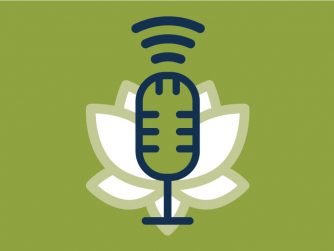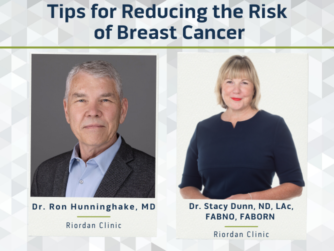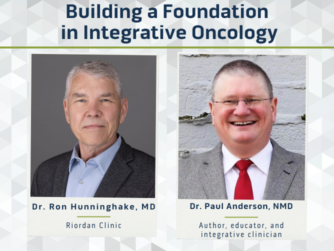In this episode of the Real Health Podcast, Chief Medical Officer Dr. Ron Hunninghake, MD, introduces Dr. Stacy Dunn, ND, LAc, FABNO, FABORM. Dr. Dunn joins the Riordan Clinic as the newest member of the integrative oncology team in the Overland Park location.
Disclaimer: The information contained on the Real Health Podcast and the resources mentioned, are for educational purposes only. They are not intended as and shall not be understood or construed as medical or health advice. The information contained on this podcast is not a substitute for medical or health advice from a professional who is aware of the facts and circumstances of your individual situation. Information provided by hosts and guests on the Real Health Podcast or the use of any products or services mentioned, does not create a practitioner patient relationship between you and any persons affiliated with this podcast.
Intro: This is the Real Health Podcast brought to you by Riordan Clinic. Our mission is to bring you the latest information and top experts in functional and integrative medicine, to help you make informed decisions on your path to real health.
Dr. Ron Hunninghake: So welcome everyone. This is Dr. Ron Hunninghake, and this is our Real Health podcast, and I’m speaking to you from Overland Park. And our guest is Dr. Stacy Dunn, and she’s at the Riordan Clinic in Wichita, Kansas. And welcomed, Dr. Dunn. What’s funny though is that you’re going to be here in Overland Park when you start working, and I’m going to be back in Wichita, but today our location site is switched. But we’re very happy to hear that you are going to be joining us as our new integrative oncology doctor.
Dr. Stacy Dunn: Thank you. I’m so happy to be here.
Dr. Ron Hunninghake: So I know our audience is very interested in you and your background. First of all, I think it’s important for everyone to kind of maybe understand what is an integrative oncologist, just from your perspective, what’s unique about that compared to most oncologists?
Dr. Stacy Dunn: So in integrative oncology, we’re working with conventional oncologists to help support the patient through all phases of treatment. And so as their undergoing treatment, following treatment, and then to help prevent any likelihood of recurrence in the future. And so we’re supporting the patient through these phases and helping to keep them as healthy and strong as possible throughout treatment, helping to increase the efficacy of their treatments, helping to diminish side effects from treatments. And then ultimately, hopefully giving them a better chance overall of great prognosis.
Dr. Ron Hunninghake: Okay. So how did your path in integrative oncology, I guess you’ve been an integrative oncologist for over 20 years now?
Dr. Stacy Dunn: Mm-hmm. I have, yes.
Dr. Ron Hunninghake: How did you get into this? And I should say to our viewers, you are a former Jayhawk, right?
Dr. Stacy Dunn: I am.
Dr. Ron Hunninghake: And so how did this land you back here in Kansas again?
Dr. Stacy Dunn: Mm-hmm. So I became interested in integrative oncology when I was in naturopathic medical school. I took some specialized shifts in integrative oncology, and it combined not just naturopathic medicine, but also classical Chinese medicine, which is also one of my degrees. And then when I graduated, I wasn’t sure that that was necessarily what I was going to specialize in, but when I opened my practice in Dallas, Texas, that was my first clinic, that was primarily who came to see me. I saw a lot of cancer patients. And if you help one cancer patient, they tell their physician and they tell other cancer patients, and then that just starts to increase the number of cancer patients I was seeing. And I just loved it. I feel like it’s really helpful and it’s really meaningful work, and I love working with cancer patients.
From that point, I decided I really needed to learn more. I was on my own in Dallas, Texas and really wanted to immerse myself in the oncology field. And I applied for a position at Cancer Treatment Centers of America in Philadelphia. And I got that position and I worked with the chief of oncology there at Cancer Treatment Centers of America, and it was a wonderful learning experience. And that’s actually where I met Dr. Kirsten West, who is the other provider here.
Dr. Ron Hunninghake: That is it that you think about natural medicine, naturopathic medicine, that cancer patients are drawn to? Because there is something about the need for cancer patients to look for root causes and to get someone whose kind of supporting them in their effort to improve their basic underlying health. How does being a naturopath facilitate that?
Dr. Stacy Dunn: I think, well, we look at the whole person, and the oncologist is focused just on the cancer, which is fine, that’s what they need to be, but there’s more to the person than just the cancer. And so we look to support the patient’s overall physical health, mental health, looking at just general wellbeing. And then, yes, I think we all want to know what causative factors may have played into getting cancer in the first place. And so we look at a number of what we would call the terrain, looking at a healthy terrain and looking at factors that may, some inflammatory markers and other factors that may play into supporting cancer growth.
Dr. Ron Hunninghake: So cancer patients are usually pretty complex. There’s a lot going on in terms of their traditional care. And the approach used by integrating oncology, looking at the terrains, what would you say is the most important terrain that you work with with patients? I know there’s 10, but which one kind of shows up the most or what are the most common ones?
Dr. Stacy Dunn: Do you mean as specific markers that we’re evaluating? Oh boy.
Dr. Ron Hunninghake: A lot of people say, “It was the stress that triggered my cancer.” Some people say, “No, I was eating a lousy diet.” Other people, “It’s my family history or the place that I grew up.” Is there any kind of pattern that you typically see, or is it just all over the board?
Dr. Stacy Dunn: I think it’s all over the board. And I do love to sit down with patients and really hear their stories and listen to their backgrounds, and I think that that does give you guidance on which factors could be at play for them and then running labs that would be appropriate to evaluate that. I don’t see one, I can’t say that diet is the root cause for most patients, so that toxicity is the root cause for most patients. I think inflammation definitely plays a role. I think stress plays a role. I do think diet plays a role. All of these things absolutely contribute, but I don’t think there’s one root cause that is across the board persistent.
Dr. Ron Hunninghake:
I think one of the opportunities you bring to cancer patients, I know in the past there was a kind of a divide between conventional oncology and natural approach to cancer. It was like they were two separate worlds. Do you see integrative oncology literally integrating those two worlds where people can feel like they’re working better with their oncologist and with natural approaches to healing their cancer?
Dr. Stacy Dunn: Absolutely. I think that’s ideal. I think taking the best from both worlds gives everyone the best chance for survival and long-term survival. Yes, but I was most recently working in Oregon and we worked very closely with our medical oncology team there. They referred us many patients and appreciated the work we were doing to help support patients throughout treatment.
Dr. Ron Hunninghake: You can more or less serve as a bridge between the two, I guess you’d say, paradigms of care, and helping people to be able to join forces rather than feeling like one side is against the other.
Dr. Stacy Dunn: Absolutely. People shouldn’t have to choose, and they work so beautifully together. It works best together.
Dr. Ron Hunninghake: Can you give me an example of how, let’s say if you’ve got a patient with colon cancer and they’re talking about doing surgery, how would you work with that patient in a way that would help bridge the gap in terms of the natural approach compared to the surgical and oncologic approach?
Dr. Stacy Dunn: Sure. So there’s a number of things that we can do to help prepare them for surgery so they heal more quickly from surgery, so that’s where I would start. And then once the surgery is complete, then I would work on helping, depending on what their treatment plan is, if they have other treatments down the road, conventionally speaking, then we would support those. But if not, then I would work to really clean up the diet and work on some of those underlying issues, sleep and stress and nutrition to help prevent recurrence down the road.
Advertisement: There’s a lot more to this conversation, and it’s coming up right after a quick break. Today’s episode of the Real Health Podcast is brought to you by the Riordan Clinic Nutrient Store. The Nutrient Store is your resource for the highest quality nutritional supplements. Every supplement in the store is handpicked by the expert medical staff at Riordan Clinic, providing you with the best quality, purity, consistency, and effective dosing available. Visit store.riordanclinic.org to shop online.
Dr. Ron Hunninghake: So has this changed your perspective on the ability of cancer patients to get well? I mean, I think a lot of cancer patients feel when they get a cancer diagnosis, they’re more or less doomed. I mean, obviously, they’re hoping for the best. But what kind of advantages do you see for a cancer patient to have a good integrative oncologist working with them?
Dr. Stacy Dunn: Right. I mean, I think we do see better outcomes. I think we see people living longer than what they were predicted to live. I think that we see less recurrence. I think that we do see, we definitely see that clinically, there are just a handful of studies, I think, looking at integrative oncology as a whole and pairing it with conventional treatments and those outcomes, we need more data. But I know from what I see and what my colleagues see, we see better outcomes.
Dr. Ron Hunninghake: What qualifies you to be a FABNO integrative oncologist? What are the educational steps that are required, just so that our audience knows about that?
Dr. Stacy Dunn: Yeah. So you sit for a board exam and you have to have at least five years of experience in integrative oncology to sit for that exam, to earn the additional board certification.
Dr. Ron Hunninghake: Okay. In your thinking, having been in this field for 20, 22, 24 years, something like that, what would you personally do to reduce your own risk of cancer? I mean, of the different things that are out there, what are some of the things you think would be the best thing for just the average person to start now, before you’re ever diagnosed with cancer, what could you do to prevent your own cancer?
Dr. Stacy Dunn: Yeah. I mean, I think basic lifestyle, the things that we do day in, day out affect our health the most. And so eating well most of the time, exercising most of the time, eating a lot of vegetables, sleeping well most of the time, dealing with your stress. I mean, we’re all exposed to stress, but how are we dealing with that and what tools are we utilizing to help reduce stress and those stress hormones? So I mean, that’s what I would recommend and that’s what I do myself.
Dr. Ron Hunninghake: One of my favorite books is a book called Anti-Cancer, and it comes out of MD Anderson. And one of the things that he emphasizes is that our connectivity with our family, our friends, co-workers, which obviously it reduces stress, but having that connectivity can actually help reduce your risk of getting cancer and improve your outcomes if you do have cancer. And at the Riordan Clinic, we emphasize the doctor-patient relationship as co-learners. And so how does that strike you, in your background, does co-learning mean something special to you?
Dr. Stacy Dunn: I love that term, and it’s not something I’ve utilized in the past, but it definitely describes my relationship with patients, and I learn from them every day in every appointment. And like I said, I love establishing that relationship, I love learning about my patients and their stories, and it’s important to know that, it’s important as I develop a treatment plan for them, to really get to know them well.
Dr. Ron Hunninghake: I would think that your background in acupuncture would also be another dimension that we have not had the advantage of having at Riordan Clinic, that will enhance your ability to work with pain, to improve circulation. I mean, are there other facets that acupuncture can bring to a cancer patient?
Dr. Stacy Dunn: Right, so it does help to alleviate so many side effects. And as you mentioned, pain, and it helps with insomnia, hot flashes are common during breast cancer or prostate cancer treatment, super helpful for that. Things like even xerostomia or dry mouth that patients get after radiation to the head and neck, incredibly helpful. It’s one of the few tools I’ve actually seen work for that. So definitely symptom management, but then I think just overall balance and helping modulate those stress hormones and balancing … in classical Chinese medicine, we look at the body differently and we look at it as a terrain. And so part of the diagnostics is feeling the pulse and looking at the tongue and then listening to the symptom picture as well. But that paints a picture, and if there’s a little bit too much dampness, then we want to reduce that dampness. If there’s blood stagnation, then we want to move the blood. And so there are things that we can see that I think would be underlying contributors for disease as well.
Dr. Ron Hunninghake: Sure. Dr. Riordan was a past president of the American Holistic Medical Association, and I think sometimes with cancer, you get so fixated on treating the cancer that you forget that there is a whole person behind that cancer that needs treatment as well. And that that’s part of the terrain approach, the metabolic approach is to take care of the whole person and not just the tumor.
Dr. Stacy Dunn: Absolutely.
Dr. Ron Hunninghake: So have you seen good results? What have you noticed with your patients as a result of doing this whole person therapy?
Dr. Stacy Dunn: Do you mean with acupuncture or do you mean with all of it?
Dr. Ron Hunninghake: All of the above.
Dr. Stacy Dunn: Yeah. I mean, as I said, I think people, one, they feel better. They feel better. And I think that there is a night and day difference with people that are using these supportive therapies and people that aren’t, they feel better. And then as I mentioned earlier, you generally see better outcomes or better, whatever prognosis they were given, two years, three years, that you see people outlive that defined date that they were given.
Dr. Ron Hunninghake: Yeah. I can see our patients, they’re better engaged in the disease, and I hate to use the term fighting. Yes, we are fighting a disease, but on the other hand, I think it’s a healing process. But if you can get all of your faculties involved and get a sense that you have a really good support team, a complete support team, I think you’re going to see better outcomes with cancer patients.
Dr. Stacy Dunn: Absolutely. I agree. I agree.
Dr. Ron Hunninghake: Okay. Well, we are thrilled at the Riordan Clinic that you are joining us. And I know we have many, many patients who are looking forward to working with you. And I just want to say personally, thank you very much for choosing us and coming back to Kansas. I know you’re a native Oklahoman, but we’re not too far from there either.
Dr. Stacy Dunn: That’s right. Thank you so much. I’m thrilled to be here. I’m thrilled.
Dr. Ron Hunninghake: We are so glad to have you come on board, so thank you very much for being on our program.
Dr. Stacy Dunn: Thank you.
Outro: Thank you for listening to the Real Health Podcast. If you enjoy this episode, be sure to subscribe and leave us a review. You can also find all of the episodes and show notes over at realhealthpodcast.org. Also, be sure to visit riordanclinic.org where you will find hundreds of videos and articles to help you create your own version of real health.




